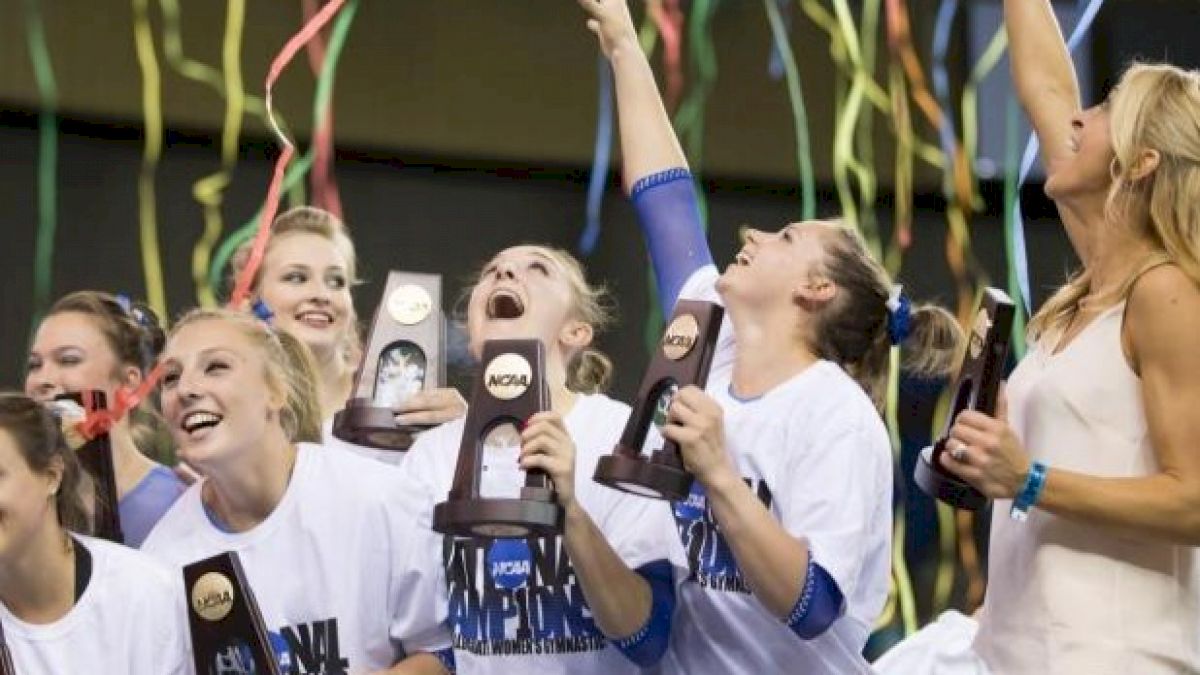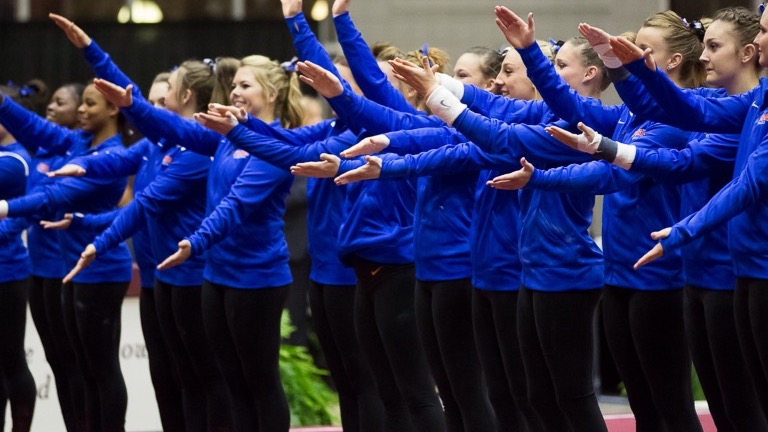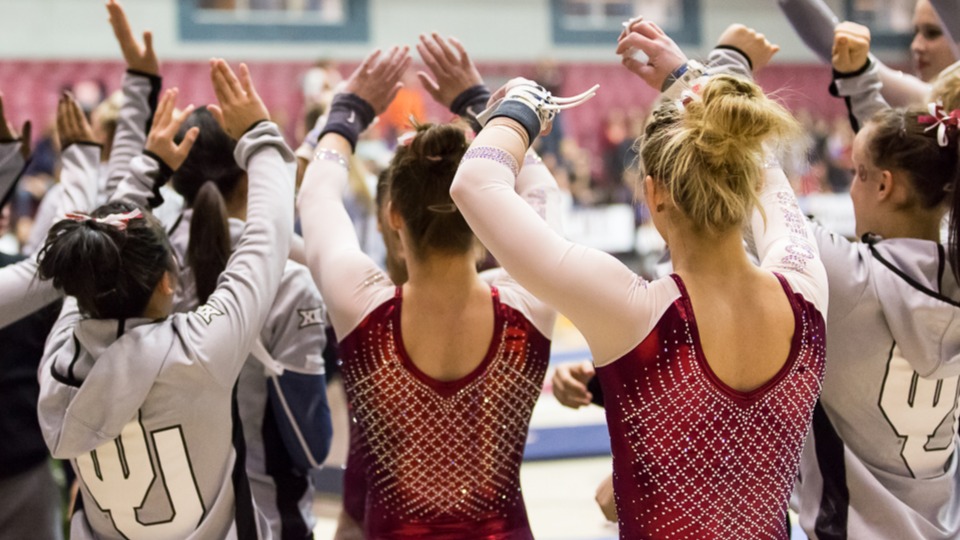Predicting Success At Super Six - What History Tells Us
Predicting Success At Super Six - What History Tells Us
Gymnastics is an unpredictable sport in many ways, especially in NCAA. A team can be on top one day and falter the next, while underdogs can creep up and su

Gymnastics is an unpredictable sport in many ways, especially in NCAA. A team can be on top one day and falter the next, while underdogs can creep up and surprise everyone. This year, in particular, we’ve seen so many strong teams that it’s tough to say who will come out with the title. Check out this year's Super Six Field.
Many people might not have predicted that UCLA would beat Utah at Pac-12 Championships, and it was a toss up to say who would win SECs between Florida, Alabama and LSU. Regionals and Semifinals will be exciting as ever to watch, and it’s anyone’s guess as to who will take home the trophy at Super Six this year.
Still, it’s fun to try to guess. And there are a couple of data points we can look to from history to help predict who might take home the Championship this year. We’ve highlighted three of these data points below and looked at the past fifteen years of NCAA Gymnastics history. Statistics buffs will know to keep in mind that it’s a small sample size and that correlation does not equal causation - but we thought you’d find these points fun to take a look at anyway!

The first point to look at is whether a team’s ranking during the regular season has any relation to success at Super Six. In general, it seems like it does. Looking back over the past fifteen years, the regular season 1st place team won Super Six nine times. The most recent example of this was Florida in 2013 and 2014. When the 1st place team did not win, such as last year with Oklahoma, the ultimate winner still always ranked within the top five in the nation. The most extreme example was when Georgia won in 2005 but was ranked #5 in the nation.
If the trend continues and the winner is ranked within the top five, then we would predict Oklahoma, Florida, LSU, or Alabama to be this year’s champion.

Another indicator is whether the winning team is ranked 1st on at least one event in the regular season. This is perhaps one of the stronger indicators, because in the past fifteen years, the winning team has been ranked 1st on at least one event in the regular season 13 times. The two exceptions to this were in 2012 and 2005. In 2012, Alabama won the championship but was ranked #2 on vault, #6 on bars, #4 on beam and #3 on floor. In 2005, Georgia won the championship but was ranked #5 on vault, #6 on bars, #9 on beam and #3 on floor.
This year, Oklahoma ranks number one as a team overall, as well as number one on bars, beam and floor, and LSU ranks number one on vault.

Another interesting data point to look at is whether the event each team starts on impacts their performance. We looked at the winners over the past fifteen years and did not find a huge correlation, however it seems that those teams who started on either a bye, vault or beam seemed to win more often. A third of the time, when the team started on a bye they won the championship. Interestingly, only once has a team who started on bars go on to win the championship over the past fifteen years, and only twice on floor (both of those times it was UCLA).
Have a prediction of your own? Let us know what you think! Follow our live updates of Super Six here!
Related:
NCAA Semifinals Recap: Oklahoma Leads The Pack Going Into Super Six
2016 NCAA Championships Super Six Field Set
2016 NCAA Individual Titles Crowned
Many people might not have predicted that UCLA would beat Utah at Pac-12 Championships, and it was a toss up to say who would win SECs between Florida, Alabama and LSU. Regionals and Semifinals will be exciting as ever to watch, and it’s anyone’s guess as to who will take home the trophy at Super Six this year.
Still, it’s fun to try to guess. And there are a couple of data points we can look to from history to help predict who might take home the Championship this year. We’ve highlighted three of these data points below and looked at the past fifteen years of NCAA Gymnastics history. Statistics buffs will know to keep in mind that it’s a small sample size and that correlation does not equal causation - but we thought you’d find these points fun to take a look at anyway!
1. Regular Overall Season Ranking

The first point to look at is whether a team’s ranking during the regular season has any relation to success at Super Six. In general, it seems like it does. Looking back over the past fifteen years, the regular season 1st place team won Super Six nine times. The most recent example of this was Florida in 2013 and 2014. When the 1st place team did not win, such as last year with Oklahoma, the ultimate winner still always ranked within the top five in the nation. The most extreme example was when Georgia won in 2005 but was ranked #5 in the nation.
If the trend continues and the winner is ranked within the top five, then we would predict Oklahoma, Florida, LSU, or Alabama to be this year’s champion.
2. Regular Season Rankings on Each Event

Another indicator is whether the winning team is ranked 1st on at least one event in the regular season. This is perhaps one of the stronger indicators, because in the past fifteen years, the winning team has been ranked 1st on at least one event in the regular season 13 times. The two exceptions to this were in 2012 and 2005. In 2012, Alabama won the championship but was ranked #2 on vault, #6 on bars, #4 on beam and #3 on floor. In 2005, Georgia won the championship but was ranked #5 on vault, #6 on bars, #9 on beam and #3 on floor.
This year, Oklahoma ranks number one as a team overall, as well as number one on bars, beam and floor, and LSU ranks number one on vault.
3. Starting Rotation at Super Six

Another interesting data point to look at is whether the event each team starts on impacts their performance. We looked at the winners over the past fifteen years and did not find a huge correlation, however it seems that those teams who started on either a bye, vault or beam seemed to win more often. A third of the time, when the team started on a bye they won the championship. Interestingly, only once has a team who started on bars go on to win the championship over the past fifteen years, and only twice on floor (both of those times it was UCLA).
Have a prediction of your own? Let us know what you think! Follow our live updates of Super Six here!
Related:
NCAA Semifinals Recap: Oklahoma Leads The Pack Going Into Super Six
2016 NCAA Championships Super Six Field Set
2016 NCAA Individual Titles Crowned